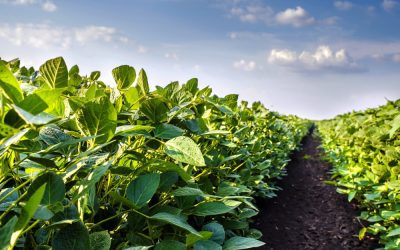Evansville area farmer Steinkamp completes service on ASA board
“Whether you’re 22 or 72, it’s good to get involved.”
Joseph Steinkamp, a retiring American Soybean Association (ASA) director, who did get involved in a myriad of ways promoting and furthering soybean markets beginning with the Indiana Soybean Board in 2008.
“Why did I wait so long to get involved in state and national ag organizations?” asked Steinkamp, a farmer from Evansville. “I don’t know, but I’ve learned so much and am so glad I got involved first with the Indiana Soybean Alliance (ISA).”

Steinkamp’s commitment to everything soybean has grown exponentially through the years. Early on he served on ISA’s Membership & Policy Committee (M&P), eventually being elected chair. Later he was elected ISA vice president, then president in 2016. In 2012, several ISA directors encouraged him to run for an open seat as one of two ASA directors representing Indiana. He was elected to ASA’s Governing Committee in 2015, then again in 2018 and 2019.
“While I was doing double duty as ISA president and on ASA’s board, I decided I couldn’t be on every committee at the state, so I shared those responsibilities with other leaders,” Steinkamp said. “While on ASA’s board, I was fortunate to be a part of their Strategic Planning Committee, as well as Trade Policy and the International Affairs Committee.”
His ASA committee involvement netted him an appointment to the USDA’s Agricultural Policy Advisory Committee (APAC) where he sat in multiple meetings with then-USDA Secretary Sonny Perdue and U.S. Trade Representative Robert Lighthizer as they prepared for the negotiation of free trade agreements before and during the Trump Administration.
“There were various ag interests around that APAC table – non-GMO growers, citrus growers from Florida, almond growers from California,” Steinkamp said. “Our collective job was to write and present papers to advise the Secretary of Ag and the Trade Representative. My job was to give farmer input and look out for those of us back on the farm while ASA experts carried the heavy load writing the actual papers.”
Steinkamp believes APAC’s efforts were critically important. “I was disappointed we didn’t get the Trans- Pacific Partnership (TPP) agreement pushed through before the end of the Obama Administration, but the APAC is a great example of trade officials and farmers working together,” Steinkamp said. “It’s so crucial we visit with the people who want to buy our soybeans. China uses our soybeans to raise more fish in their aquaculture operations – 90 percent of the fish eaten is not grown in the U.S. – and they use our soybeans to feed their chickens and hogs. Visiting our customers helps grow ag in world markets.”
Steinkamp’s priorities before joining ISA were close to home and not big picture state and national goals. He realized quickly how decisions made elsewhere impact him and his fellow farmers.
“Now I think about what goes on in Indianapolis and Washington, D.C., as it has a huge impact on my farm,” he said. “ISA’s Membership & Policy Committee is making a huge difference in these spaces. We all must help educate our legislators so they can be more effective.”
Steinkamp emphasizes the soybean checkoff helps farmers grow more soybeans, finds new uses and does marketing of soybeans to international customers. “The soybean checkoff is critically important in finding new uses and new markets for our soybeans as we continue to produce more bushels,” he said.
Help at home
Steinkamp grows soybeans, corn and wheat in rural Vanderburgh County near Evansville, Ind. A full-time farmer, Steinkamp started farming in 1999. He earned a bachelor’s degree in agricultural economics from Purdue University in 1988. He specializes in growing a foodgrade, white corn that is used in making tortilla chips. Steinkamp and his wife, Joni, have three daughters.
He farms in a partnership with his cousin, Tim Steinkamp, and Tim’s son, Jon. Steinkamp is grateful for Tim and Jon for keeping the family farming operation going when his commitments and appointments to ag leadership positions took him away for long periods of time.
Not all legislative work, though, happens in the halls of democracy in the nation’s capital. Once, Steinkamp had a memorable meeting in the Evansville airport.

“In Washington, D.C., there are very few agricultural decision makers, so if you get the chance to bend the ear of such a maker you take it,” he said. “More doors may open for you as a result. I ran into then-Sen. Joe Donnelly. I introduced myself and had 15-20 minutes of conversation with him. Getting off the plane in D.C., he offered me a ride to my hotel because his apartment was close. We talked even more about ag policy while driving, after that every time I was in Washington, D.C., at his office, he knew who I was. It was a great experience that everybody wants to have.”
Steinkamp believes the biggest challenge for soybean organizations is to continue learning how to communicate with our customers and people who don’t agree with us. “So many people feel free to share whatever they believe is a fact, whether it’s actually true and backed by science or not,” he said. “Our organizations’ truths, facts and science are shared. We take it to heart. We want our customers and the general public to know we are trustworthy producers and to consider us as experts.

“We have to keep working at it. With less than 2 percent of the population in production agriculture, 98 percent of the population will continue to need convincing. Our soybean organizations must continue to focus on supplying the general public with quality, science-based information in creative and informative ways. I hope the next generation of soy leaders are open minded and have forethought to not be afraid to try new ideas. We must keep reinventing ourselves and develop new ways to do things. We have to continue training farmers elected to these boards to be great communicators.”
Partnership with Purdue
As his service to ASA winds down, Steinkamp reflects on some of the projects that he’s proud of and has enjoyed. He cited the creativity of Purdue’s partnership with ISA in the 27-year-old Student Soybean Innovation Competition that drives new products and uses for soybeans. “So many people have been and are getting involved annually with this effort,” Steinkamp said. “More professors and students know about soybeans because of the contest. Without the contest they would have never given them a second thought. They can now be advocates for us.”
He added, “The concrete durability enhancer containing soy is gaining notoriety for its durability on bridges and roads. “Nationally, it was very positive when the USMCA free trade agreement was signed with Mexico and Canada. We got the 2018 farm bill signed, and as ISA’s president presiding over ISA’s 50th year anniversary are all memorable experiences.”
USDA-sponsored, international travel took Steinkamp as the only ASA director to Ghana to help teach about food sustainability. “The U.S. wanted Ghana to use more of their soybeans to help people raise more chickens,” he said. “The average person in that country only eats 11 eggs per year, so we wanted to increase the health and protein of the people there. We also had a free Saturday, so we visited open air markets where we found U.S. chickens fed with U.S. soybeans kept frozen by a portable generator.”
Steinkamp is a modest and humble man, but he enjoyed a unique opportunity when former ISA Executive Director Jane Ade Stevens asked him to be one of the first featured farmers in the Glass Barn at the Indiana State Fair.
“I was able to do live chats during the fair, they produced a video of me on our farm that played in the Glass Barn, and I even had my own cardboard cutout,” Steinkamp said. “I used my media training provided by ISA to do the live chats answering questions form the audience. On the video, my youngest daughter tells everyone when she runs the farm that she’d paint the tractors pink. She is now farming with us. Such a great experience for me and my family, and I owe it all to getting involved with the Indiana Soybean Alliance.”




Posted: November 1, 2022
Category: Indiana Corn and Soybean Post - Holiday 2021, ISA, News




